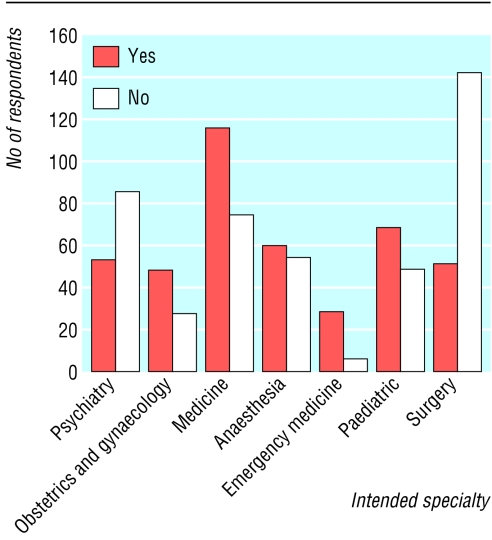Editor—How doctors in training view the changes in their working pattern that will be required by the European working time directive is not known.1 By 2004 it will limit their continuous working to no more than 13 hours in 24. As work has been defined as being at the workplace on duty, even if sleeping, this will mean shift work for those who must be resident when on call.
Some British doctors in training have indicated that they are opposed to any reduction in working hours because of the impact on the experience or the education they would acquire.2 Others have been opposed to the idea of shift work because of the impact on their personal or social lives.3 We explored whether such views were general.
We used methods previously reported to conduct a survey of trainees at all grades and in all specialties in NHS trusts in south London.4 We asked: “Would you like a working pattern of 56 hours or less in shifts of no more than 13 hours?” Those who answered “no” were asked to give the main reason why not. We received 1548 responses out of a possible 2100, a response rate of 73.7%. Of the respondents 51.8% were men (803/1548).
Negative attitudes to shift working increased with seniority (table). No significant difference was found between the responses of men and women in each grade. The figure shows the responses of senior house officers and specialist registrars intending a career in the different specialties. Only intended psychiatrists and surgeons were mainly opposed to shift working.
The main reason given for opposing shift work among surgeons was the likely impact on experience (63%, 87/138), followed by the likely impact on social/family life (25%, 35/138). For other trainees the likely impact on social or family life was the response chosen most often (46%, 193/417), and the likely impact on experience was less important (21%, 86/417).
The anxieties of senior trainees about the impact on social or family life and the anxieties of surgeons in training about the impact of shift work on their experience must be taken seriously. Whenever practicable, senior trainees should be allowed to be on call from home, reducing the need for shift working.
Table.
Answers to question: “Would you like a working pattern of 56 hours or less in shifts of no more than 13 hours” by grade. Values are numbers (percentages) of doctors
| Grade
|
Yes
|
No
|
Don't know
|
|---|---|---|---|
| Preregistration house officer (n=229) | 125 (54.6) | 46 (20.1) | 58 (25.3) |
| Senior house officer (n=689) | 353 (51.2) | 229 (33.2) | 107 (15.5) |
| Specialist registrar (n=630) | 232 (36.8) | 315 (50.0) | 83 (13.2) |
| Total (n=1548) | 710 (45.9) | 590 (38.1) | 248 (16.0) |
Pearson χ2=82.198, df=4; P<0.001.
Figure.
Senior house officers' and specialist registrars' preference for working 13 hour shifts in 56 hour week by intended specialty
References
- 1.Pickersgill T. The European working time directive for doctors in training. BMJ. 2001;323:1266. doi: 10.1136/bmj.323.7324.1266. [DOI] [PMC free article] [PubMed] [Google Scholar]
- 2.Alkhulaifi A, Allen SM, Anderson JR, Argano V, Austin C, Barlow C, et al. New deal not satisfactory for cardiothoracic surgery. BMJ. 1995;311:953. [Google Scholar]
- 3.Mather H Royal College of Physicians Trainees Committee. The Royal College of Physicians specialist registrar shift survey. Hospital Med. 2002;63:429–431. doi: 10.12968/hosp.2002.63.7.1989. [DOI] [PubMed] [Google Scholar]
- 4.Paice E, Aitken M, Cowan G, Heard S. Trainee satisfaction before and after the Calman reforms of specialist training: questionnaire survey. BMJ. 2000;320:832–836. doi: 10.1136/bmj.320.7238.832. [DOI] [PMC free article] [PubMed] [Google Scholar]



